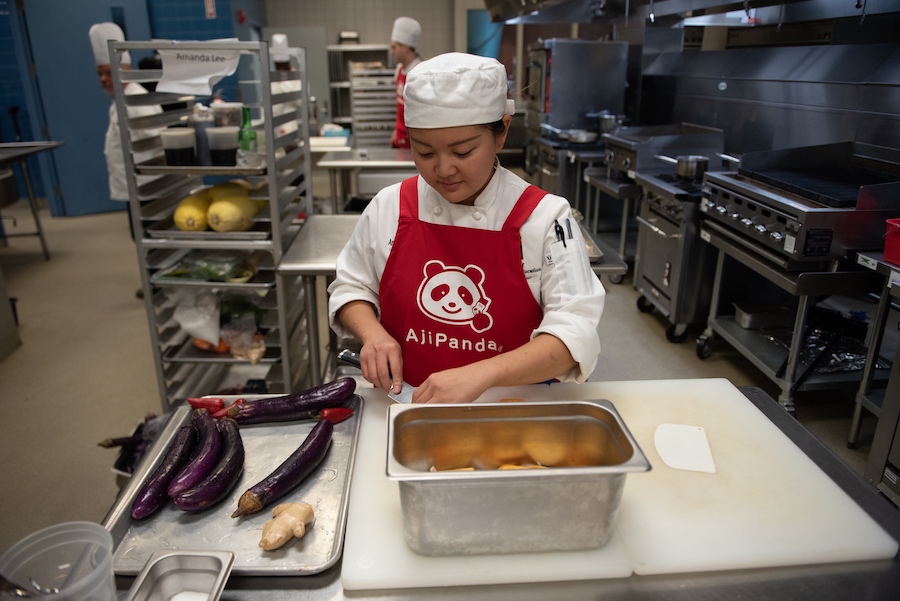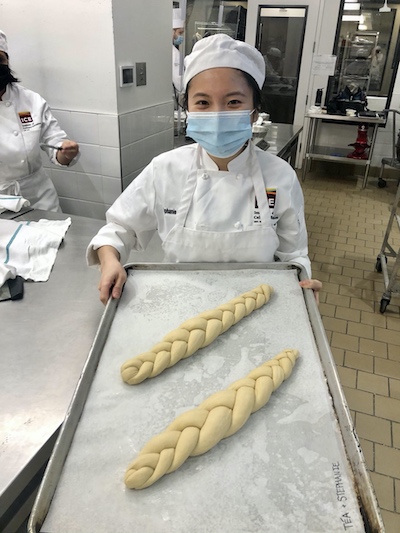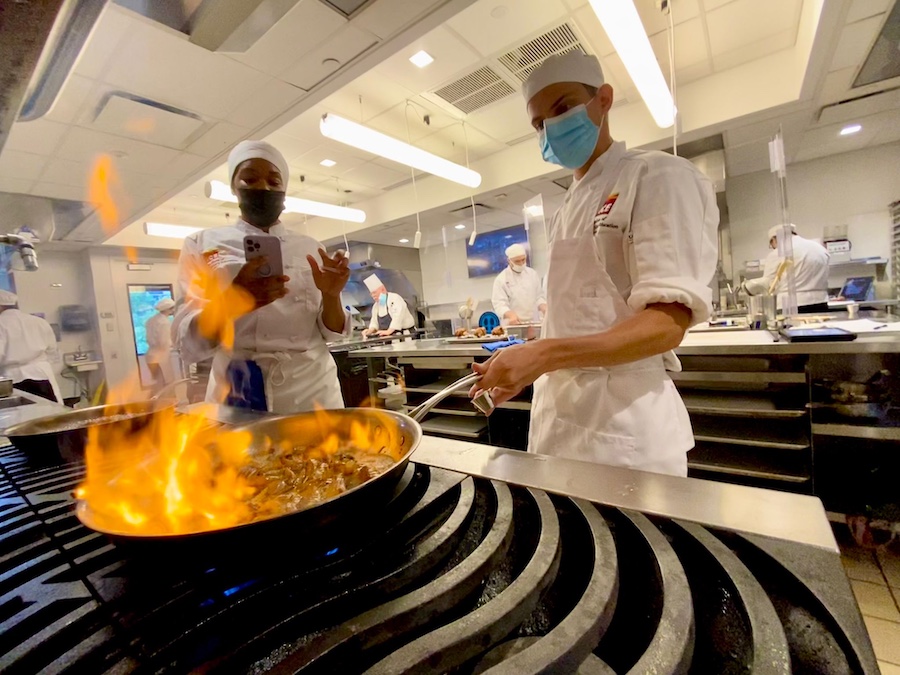Considering a career change? Some former and current ICE students share their experiences leaving business jobs to pursue restaurant industry careers.
So you’re thinking of changing careers, especially after the last 18 months as, like so many other people, the pandemic has reoriented your priorities.
There’s a good chance you have some kind of background in business. It’s the most common type of bachelor’s degree in the U.S., according to the National Center for Education Statistics. And 8.8 million people in America work in the financial activities sector, according to the Bureau of Labor Statistics.
But a job doesn’t have to be forever, and making the jump from the boardroom to the kitchen isn’t as daunting as it may seem.
"If you retire at 65, [that means] I still have 30-plus years to go. If you look at it that way, you're very early, actually, in your career path," says Kristin Ambrosino (Culinary, '21) of changing careers at 33. "Why wait longer to make a change? Take the risk, take the leap and do it now."
Kristin worked in finance for 11 years, managing large teams and multibillion-dollar portfolios. But like so many other ICE students who came from the corporate world, there eventually came a time to pursue something new and more engaging.
"It's definitely hard work, but I feel so much more validated working in a 100-degree kitchen until 11 p.m. than sitting at my desk doing something that is, like, not fulfilling my soul," says Amanda Lee (Culinary, '19), who spent two years working as a leasing coordinator in the New York City area before enrolling in Culinary Arts.
ICE students come from all walks of life — recent high school graduates, military veterans, career changers and more — and it’s normal for people to take time when deciding whether to attend culinary school. Amanda, who went on to win the United States of Umami Culinary Competition while attending ICE, says she attended an open house more than a year before making the switch from corporate life to the food world.

Stephanie Loo (Pastry, '21), who graduated from The Wharton School and worked at a private foundation within a hedge fund, says in the back of her mind she always knew she’d pursue pastry making and restaurant work. Her business experience is helping that transition at age 24.
"Even though I'm in pastry now and going into food, I think I still do very much think like a business person. Thinking about costs and how to make money still definitely comes very naturally to me," Stephanie says. "Maybe I'll open my own place one day. I think it'd be fun."
Managing costs is just one skill that overlaps the culinary and business worlds. Professional kitchens and fast-paced trading floors can be pressure-filled environments that require teamwork, critical thinking and multitasking.
"Although you're tackling different problems, you [have] to be able to problem-solve and do it quickly," says Matt Wagner, who worked at JP Morgan for nearly five years before beginning Culinary Arts in June at age 27. Now he says he makes a "mean brined pork chop" and enjoys having a fridge stocked full of leftovers following a day of classes — a "definite perk."
Matt liked cooking while growing up in Indiana, and he says he really "got into the culinary scene" after college when he moved to New York and saw "what food and restaurants could be at one of the food meccas of the world."
Stephanie didn’t grow up in a family that ate out a lot, so finally experiencing fine dining was eye-opening. Now that she’s worked in restaurants, she loves front-of-house work, serving people and interacting with customers.

"The first time I went out to a Michelin-starred restaurant and fine-dining experience, I was just so captivated by the experience. I loved the attention to detail, the intentionality of it, just how thoughtful everything was," Stephanie says. "I think there's a lot of storytelling in fine dining."
ICE alumni are scattered throughout some of those restaurants. Just one month into her program and without restaurant experience, Kristin was able to get a trail at Emily, a wood-fired pizzeria in Brooklyn helmed by Matt Hyland (Culinary, '05). Chef Matt then helped Kristin find her externship at Rezdôra, an Italian restaurant where she’d eventually work full-time.
"I used my finance networking skills to obtain a restaurant job working with an ICE alum," Kristin says. "You want a place with a good alumni network and where the alumni support the school, and I think that's 100% what I found here [at ICE]."
Becoming a chef isn't your only option out of culinary school. Matt says he’d "love to be a restauranteur," and his background in finance combined with his growing culinary skillset "could be viewed as a pretty big advantage" when delving into restaurant management.
Amanda, inspired by Andrew Zimmern’s "Bizarre Foods," says her dream job would be in food media. (She externed at Marea because of one episode she vividly remembers in which Zimmern eats fusilli with bone marrow and octopus at the restaurant.) Now Amanda’s back at ICE taking the six-week Wine Essentials class, and at age 28 she’s about to start working at Genesis House, a soon-to-open restaurant near The High Line.

Culinary school graduates pursue a range of career paths, and what ICE instructors teach can be applied outside of the kitchen, too.
"The phrase mise en place, I feel like just applies to everything in life," says Matt, who’s on module two of his culinary program. "Because it just means 'everything in its place,' and basically making sure you are as prepared as you can be. It'll definitely be something that I take with me going forward."
Kristin says she came to culinary school not wanting to be a chef or own a restaurant instead, wanting to figure out how to marry her skills in finance and food. She wants her next career to be something exciting, something she can talk about always, something that can offer her continuous learning and can take her anywhere.
"I highly recommend it [culinary school] to people, even if they are just using it to take a break and reset and not necessarily wanting to go into food as a career. I think the skill set that you learn here is extremely valuable just as a person, and you can use it for the rest of your life," Kristin says.
Pursue culinary skills and life lessons career training at ICE, and see how you can apply your business experience to develop a food concept plan in Restaurant & Culinary Management.




